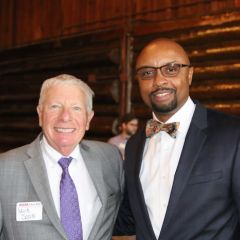Accusing Judges: Balancing Lawyer Ethics and Free Speech
All attorneys have opinions about judges. Those opinions are sometimes negative and are often shared around the office, or when talking shop with a colleague.
But lawyers should beware of voicing those opinions in a more public forum. Rule 8.2 of the Illinois Rules of Professional Conduct prohibits attorneys from knowingly making false statements concerning the qualifications or integrity of a judge.
So when do opinions become lies? The First Amendment protects people who are stating opinions. It doesn't protect defamatory speech. And the issue gets even more complicated when that speech is part of a document filed with the court.
Some years back, the seventh circuit considered the nexus between the First Amendment and ethical rules in In re Palmisano, 70 F.3d 483 (7th Cir. 1995). There, the court reviewed a rule to show cause why an attorney who had been disbarred in Illinois should not be disbarred by the U.S. District Court for the Northern District of Illinois as well.

 Asked and Answered
Asked and Answered Learn how outpatient mental health commitment orders are being developed and implemented in Cook County and around Illinois with this informative half-day seminar in Chicago or via live webcast on May 17, 2017. Discover how to get a person the mental health treatment they need in the community, while gaining the perspective of both the mental health provider and the patient regarding outpatient mental health commitments.
Learn how outpatient mental health commitment orders are being developed and implemented in Cook County and around Illinois with this informative half-day seminar in Chicago or via live webcast on May 17, 2017. Discover how to get a person the mental health treatment they need in the community, while gaining the perspective of both the mental health provider and the patient regarding outpatient mental health commitments.



